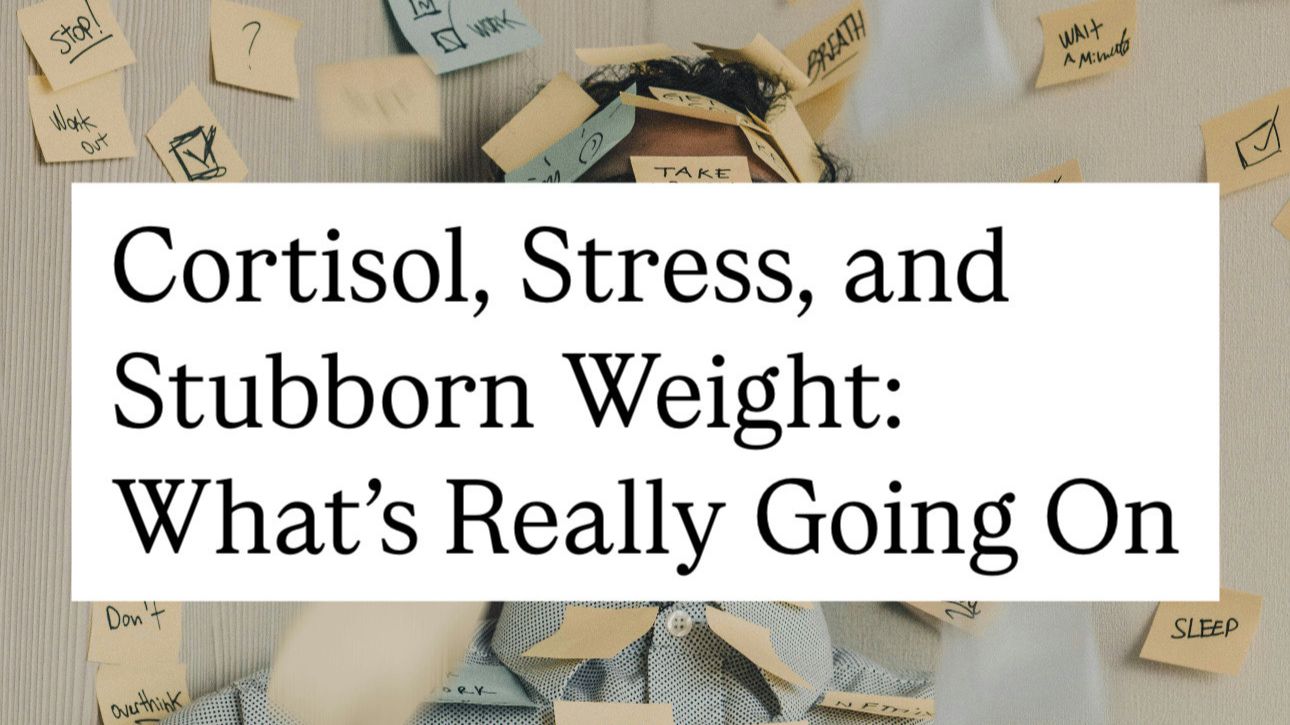Cortisol, Stress, and Stubborn Weight: What’s Really Going On
May 02, 2025
Disclaimer:
This blog post is for informational and educational purposes only and is not intended as a substitute for medical advice, diagnosis, or treatment. Always seek the advice of your physician or qualified health provider with any questions you may have regarding a medical condition or treatment plan. Do not disregard professional medical advice or delay in seeking it because of something you have read here. The information provided is based on personal experience and research and is intended to support, not replace, individualized medical care.
If you’ve ever cleaned up your eating, started walking more, maybe even added fasting into your routine—and still felt like your body wouldn’t let go of the weight—there’s a strong chance cortisol is involved.
In this post, we’re breaking down what cortisol actually is, how it gets out of balance, how it directly impacts insulin, blood sugar, and fat storage, and what to do if you’re dealing with the aftermath of chronic stress or steroid use like prednisone.
Let’s get into it.
💡 What Is Cortisol, Really?
Cortisol is often labeled the “stress hormone,” but in a healthy body, it does a lot of important things:
- Helps you feel awake and alert in the morning
- Regulates blood sugar between meals
- Calms inflammation during short-term stress or injury
- Keeps blood pressure and fluid balance in check
- Works in sync with melatonin to support your sleep-wake rhythm
It follows a daily rhythm, peaking shortly after waking and gradually tapering off as the day goes on. This natural rhythm is essential for hormone balance, energy, metabolism, and even fat loss.
🧠 How Cortisol Gets Off Track
Here’s what disrupts that healthy rhythm:
- Chronic stress—emotional, physical, or metabolic
- Poor sleep or inconsistent bed/wake times
- Under-eating or overtraining without recovery
- Stimulants and caffeine used to compensate for low energy
- Steroids like prednisone, which override the body's natural cortisol production
When these factors persist, your body stays in a state of survival, and that changes everything.
🔁 Cortisol, Blood Sugar & Insulin Resistance
Cortisol's main job under stress is to flood your bloodstream with glucose—giving you quick energy to run, fight, or survive. But when there’s no real danger (just life stress, a bad night’s sleep, or an argument), that glucose has nowhere to go.
So your body releases insulin to bring blood sugar back down.
When this happens over and over:
- Insulin stays elevated
- Your cells stop responding to it (hello, insulin resistance)
- Fat burning shuts down
- And fat storage—especially around the belly—increases
This is a massive hidden reason why so many people struggle with stubborn fat even when their food and exercise are on point.
💊 How Steroids Like Prednisone Worsen the Issue
Prednisone is a powerful synthetic version of cortisol often used to reduce inflammation, calm autoimmune flares, or treat asthma and allergic reactions.
But it comes with big metabolic consequences:
- Raises blood sugar significantly
- Increases insulin and fat storage
- Triggers intense hunger and cravings
- Suppresses your natural cortisol production (which can leave you depleted after stopping it)
Even short-term use can lead to weight gain, water retention, and insulin resistance—especially if you already have blood sugar issues or a history of metabolic dysfunction.
✅ How to Recover If Your Cortisol Is Out of Balance
Whether you're coming off a steroid or just burnt out from stress and life chaos, here’s how to start supporting your body:
1. Reset Your Circadian Rhythm
- Get sunlight in your eyes first thing in the morning
- Limit screen time and blue light after sunset
- Stick to consistent sleep and wake times
2. Balance Your Blood Sugar
- Eat protein + fat first at every meal
- Use apple cider vinegar or lemon water before eating starches
- Take a 10-minute walk after meals
- Eat carbs last, not first
3. Build Muscle, Not Stress
- Start or return to strength training (2–3x/week is great)
- Walk daily to support insulin and cortisol regulation
- Avoid long, punishing cardio if your body feels depleted
4. Support the Adrenals
- Focus on mineral-rich hydration (add sea salt, electrolytes)
- Take magnesium glycinate to calm the nervous system
✨ Final Thoughts
Cortisol isn’t your enemy. It’s a messenger.
When it’s dysregulated, your body isn’t broken—it’s asking for help.
If your weight won’t budge, your energy is up and down, or you feel stuck in a cycle of stress and cravings—it's time to look beyond willpower and focus on hormonal rhythm and recovery.
You can bring your body back into balance. And when you do? Fat loss becomes a byproduct of healing—not a battle.
🎧 Want More?
This blog is based on my latest podcast episode:
👉 “Cortisol, Stress, and Stubborn Weight” – Listen now Spotify or Apple Podcasts
If you want support getting your hormones and metabolism back on track, check out my 8-week coaching program inside Lifestyle School. We go deep on strategies like this—and I walk with you step by step.
Join Lifestyle School for Weight-Loss, the step-by-step program designed to help you lose weight, feel confident in your body, and simplify healthy living. Learn how to use fasting, nutrition, and sustainable habits to create lasting results—all without the overwhelm.
Let’s do this together! 💪
Ready to Start Fasting the Right Way?
Get my "4 Steps to Getting Started Fasting the Right Way" guide for free! This quick, easy-to-follow resource will help you ease into fasting, avoid common mistakes, and feel confident on your journey to better health. Sign up now and start fasting with confidence! ✨
We hate SPAM. We will never sell your information, for any reason.
